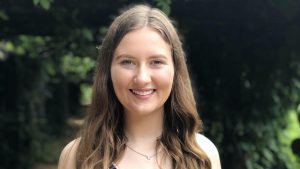Carolina junior Jessica Reid has written a book to help people understand climate change and communicate more effectively about the issue.

Growing up in Apex, North Carolina, Jessica Reid watched as an increasingly alarming number of trees gave way to new housing developments. It was something unsettling to watch, and once she saw the 2006 Oscar-winning documentary “An Inconvenient Truth,” she began to understand why.
Between learning about humans’ impact on the environment and the attendant difficulties of communicating with others about climate change, Reid’s mission to help protect the environment slowly coalesced. Now a junior in Carolina’s Environment and Science Communication program and a member of Honors Carolina, she took those two threads — the environment and communications — and wrote a book, with partial funding from the 1789 Student Venture Fund.
“Planet Now: Effective Strategies for Communicating about the Environment” explains the basics of climate change, presenting numerous strategies to help readers communicate more effectively with people who have possibly been misinformed about the issue or are overwhelmed by the information and don’t know where to start.
Following the book’s publication in September 2020, Reid explained what prompted her to tackle such a big project as a college student, how she accomplished it and why communicating about climate change is a critical mission.
Why did you decide to write a book?
It’s always been my goal to publish a book. I didn’t expect to have that opportunity in college until I learned about the Book Creators Program from Creators Institute, which connects college students and professionals with resources to help them write a book. There are a lot of other great avenues for communicating, but a book is what made sense for me in this instance.
A book allowed me to go in-depth and interview several people, especially UNC-Chapel Hill students and professors. It’s been so rewarding to talk to them. One of the reasons that I wanted to go to Carolina is because when I toured it, I saw its focus on sustainability. I was impressed by the composting. I knew that it was a place where I could continue to learn about the environment and encourage other people to keep caring about it. Taking environmental classes and participating in several environmental organizations helped me gain the knowledge necessary to write a book.
What classes or professors helped guide you toward writing this project?
Most of them. The combination of my classes in my environmental studies major has helped me gain confidence about understanding environmental issues and their solutions, so I was able to write a book to help other people. One of my favorite classes was my environmental law and policy class with Professor Donald Hornstein. I was able to interview him for the book.
How did you balance the class load with this project?
I tried to make use of school breaks a lot and take steps every week — say an interview or writing time — to be able to make some progress.
Your book focuses on “effective communication” around climate change. Why is that component so important?
There’s political polarization and misinformation in the media, so it’s difficult to know what to believe about climate change. It’s important to not judge people for their viewpoints but to understand where they’re at, and if they do misunderstand some facts, to help them by connecting climate change to the things that are important to them.
For example, if they’re concerned about the economy, we can talk about how it’s much more cost-effective to take climate action now than to make choices to reduce the terrible consequences in the future. Taking climate action can create careers right now.
And what is it that makes communication effective?
When it helps people understand an issue but also understand what they can do. Most Americans are concerned about climate change, but a lot of people feel hopeless about making an impact, understandably, because it is a scary issue. But if you only make people feel fearful, they won’t be motivated to do anything about it.
In “Planet Now,” you talk about the importance of reframing the message around climate change. How do you hope people do that?
I hope people can reframe the message to show that climate change is urgent but not hopeless. As long as we do what we can right now to make sustainable decisions, like transition to cleaner energy sources and reduce our consumption, we can make an impact that’ll give us a more sustainable future with a healthier, safer environment.
By Amanda Wicks, University Communications
